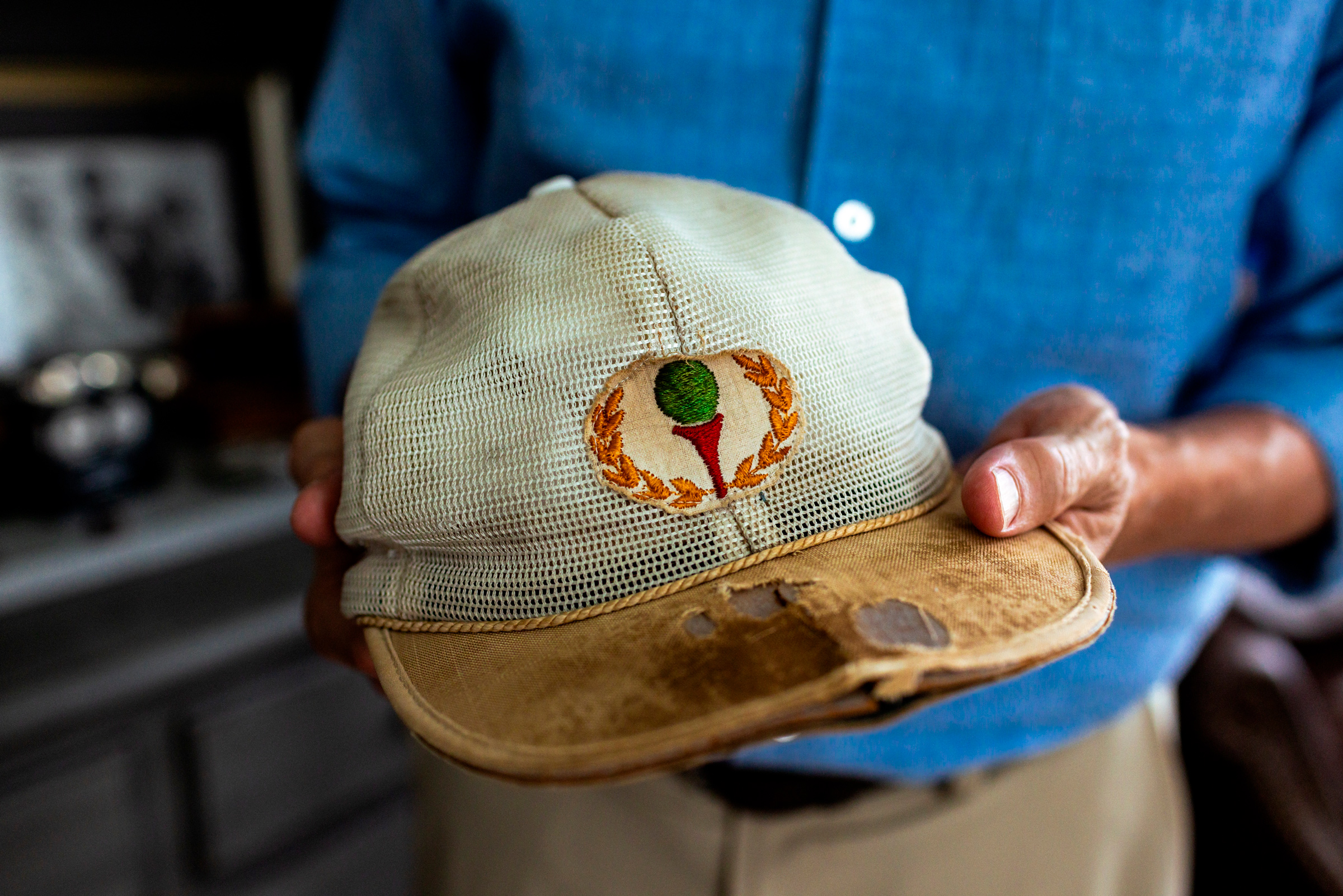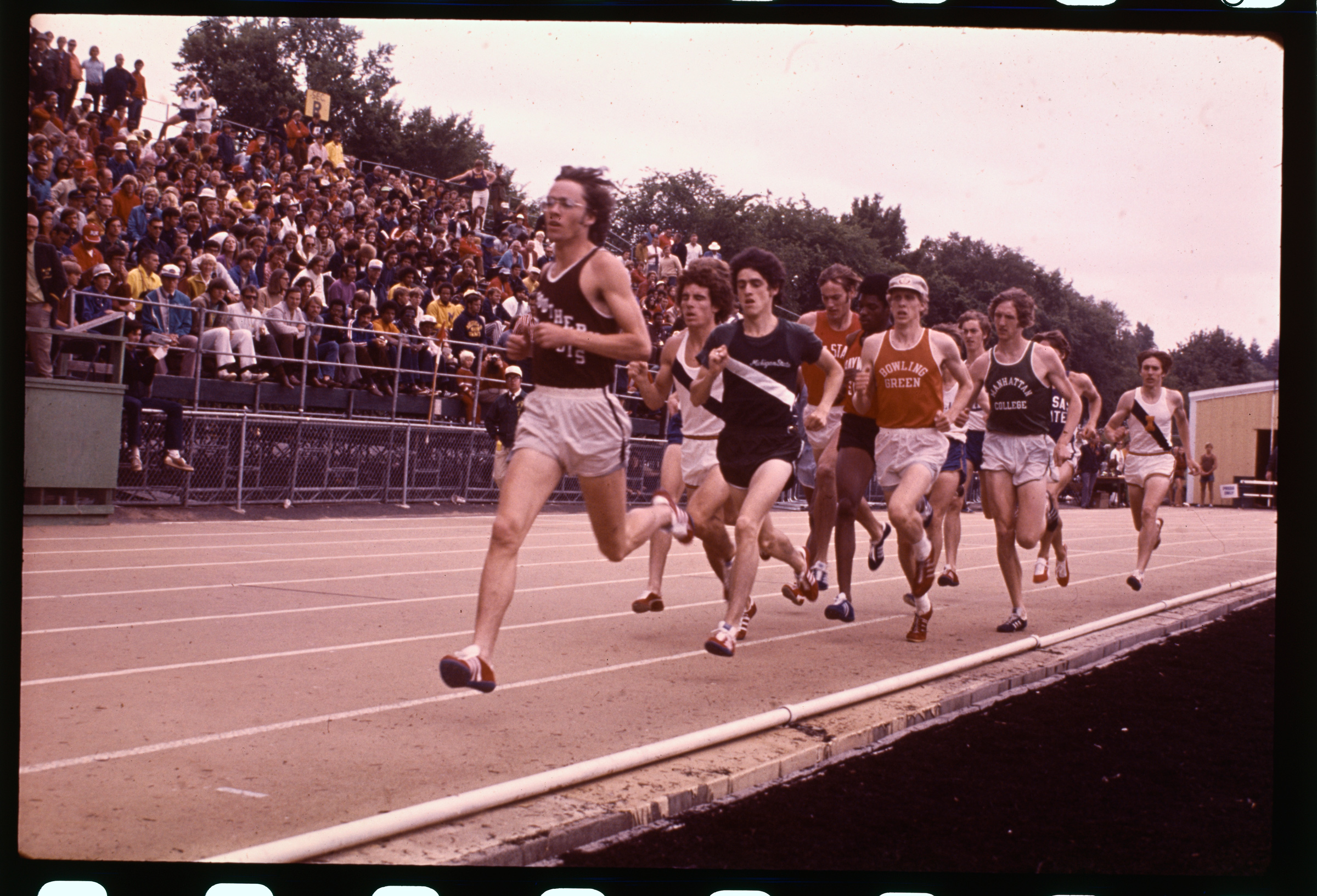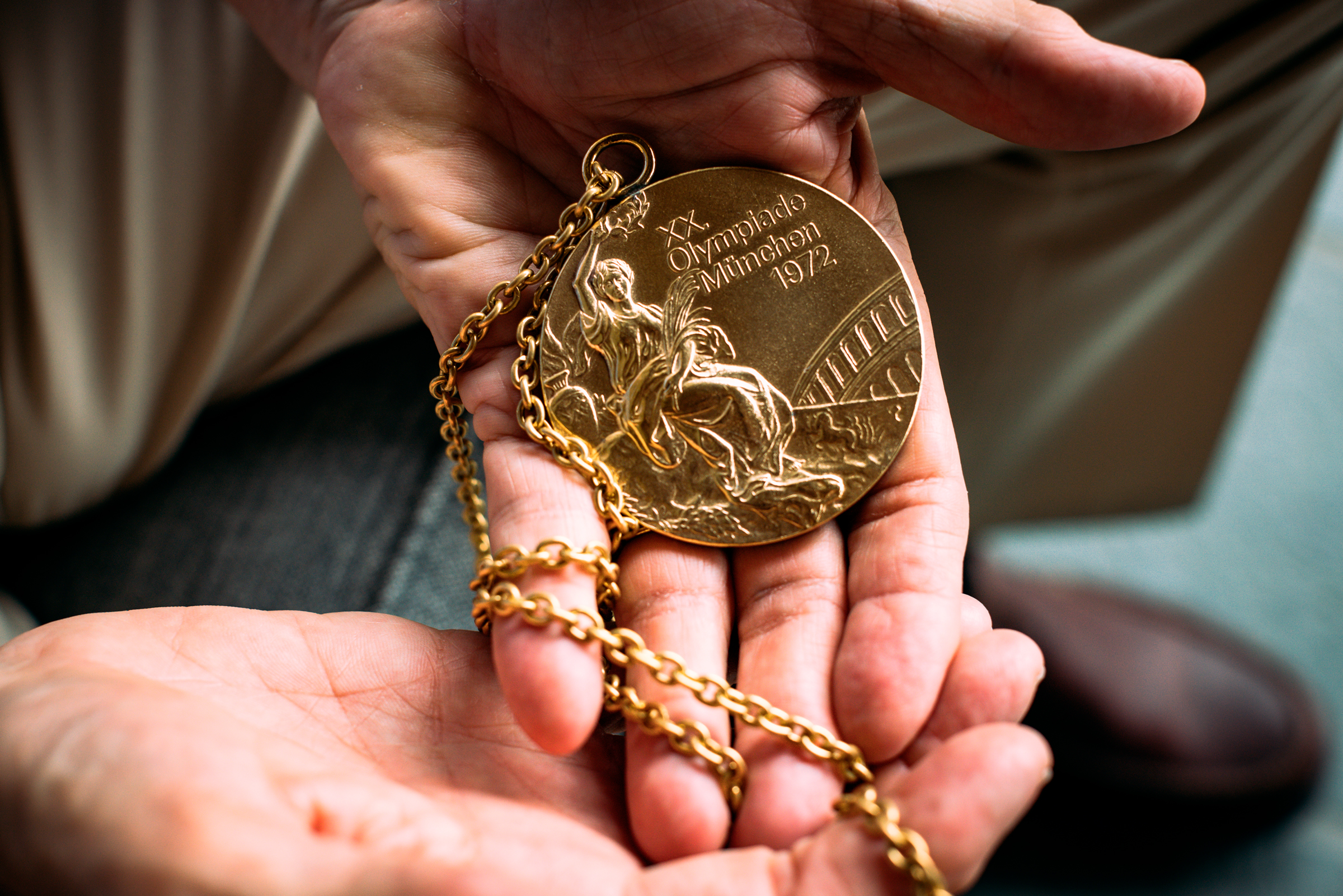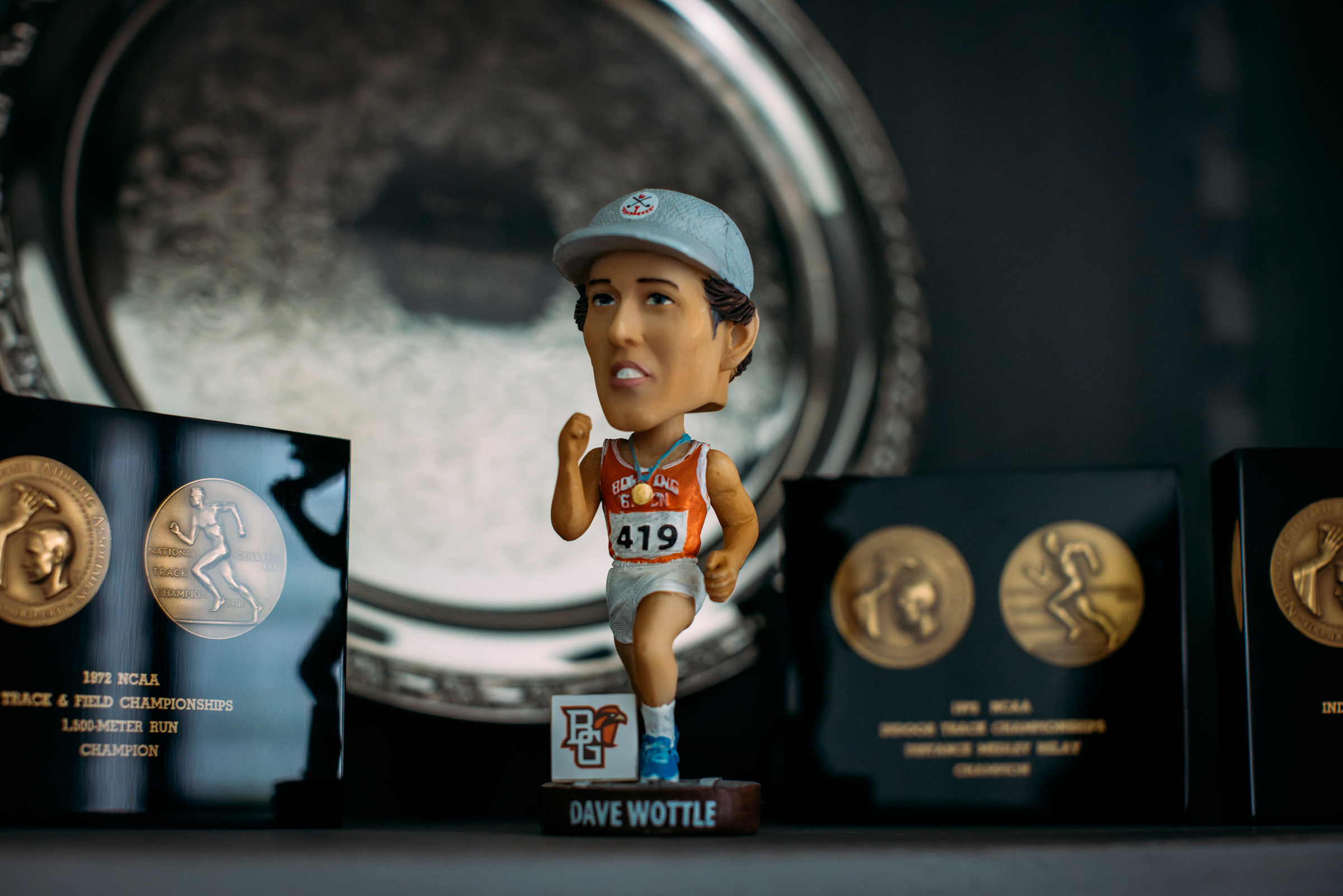
DAVE WOTTLE
The Guy in the
White Hat
INTERVIEW BY NICK WILLIS
WORDS BY ALLISON STRANG
PHOTOGRAPHY BY CHRIS MILLIMAN AND GETTY IMAGES
We often put our favorite athletes on a pedestal (or more appropriately, a podium). We almost forget the humanity in the sport, the aspects of these elites that we can identify with – the hiccups, the hard efforts, the heart-skipping seconds before one’s time flashes on the big screen. But that’s where the true inspiration lies, in the reminder that no matter how fast someone runs a curve, hands off the baton, or breaks the tape, they are human too.
Gold medalist Dave Wottle shares stories of his Games in 1972 like it’s casual conversation, punctuated by chuckles and anecdotes as if he’s chatting about anything, when in reality, he’s recalling a life-changing moment. When speaking to an athlete who’s conquered a gold medal on the biggest stage, you’d expect to hear about years of training in the event, chasing after the long sought after goal with a vision of that sacred race day. But in an act that is oh so human, Wottle shuttled all the way into first place from the back unexpectedly in the 800m, and he just happened to forget to leave his white golf cap at the sidelines.
Nick Willis sat down with Dave Wottle for a conversation that took us back to his golden games and the hat that became his hallmark.
NICK WILLIS
How did you discover running? What was the thing that got you involved in this sport that we all love?
DAVE WOTTLE
I think I got into running because I was so bad at everything else. I tried a lot of different sports, believe it or not – football, basketball, baseball, but I never really found something that clicked... I thought, I might as well sign up for track. Starting as a sprinter, I remember at my first workout, the coach came over and put his arm around me and said, “Dave I’m gonna send you where I send everybody else with very little talent - distance.”
My first time trial went fairly well, and I found my niche. The track at the park next to our high school was about a third of a mile round and we wanted to just see what we had, and I ended up beating everybody. I went home and told my parents that I finally found something that I was good at and just stuck with it. It really took me four years of development in high school before I got into the swing of things. I became state champion in the mile by my senior year, but throughout my freshman, sophomore, and junior year, I never qualified outside of the district. It was a slow, steady progress.


Wottle goes on to share his college experience. His plan to stay near his hometown was uprooted when he got a call from Bowling Green, where steeplechase star Sid Sink was growing his resume of All-American honors.
DW
He made me believe that Bowling Green could be something big in the future and changed my mind two weeks before the beginning of the semester. I moved over to Bowling Green.
NW
So when did the dream of representing the US in the Games become a thing for you to latch onto?
DW
I think I got an inkling in 1970 during my sophomore year in track. Two weeks before the NCAA was the first time I broke a four-minute mile. I ran a 3.59 flat. Then in the NCAA, I got second to Marty Liquori in the mile by two tenths of a second, and he was the number one ranked miler in the world in ‘69 and ‘71. Getting that close to him in the NCAA kind of had me thinking, I may have a shot.

Then suddenly, Wottle experienced a series of injuries and was unable to run both the indoor and outdoor seasons in 1971, shaking his newfound belief in himself and igniting a fear that his career might be over. Nevertheless, come May of that year, he made his return to the tartan almost exactly a year out from the Trials in 1972.
DW
I can remember my first competition back. I trained for about three weeks and a friend of mine called me up saying, “Let’s jump in at an all-comers meet”. So I jumped in the half mile, the gun goes off, and about 100 yards into it, I get this big grin on my face and I’m thinking, I’m back where I should be. It felt so great to be back in that world. And that was the start of my comeback towards the Games in Munich.
NW
Did you have the calendar marked for the Trials the following year? Did it become a target that you were working towards?
DW
No. I always believed in managing my objectives. I was always just doing the little things – I figured if I got enough of those little things along the way, the big things would take care of themselves. I hadn’t even run in ‘71, so I wasn’t ranked. I was basically a nobody, and I was having to build my own confidence back up after being out of competition for so long. I remember racing the Dream Mile in Philadelphia. I was able to win that. I was getting back to where I needed to be.


Dave was a tried and true miler. He excelled at the 1500m with big wins and utilized the half-mile as a run for fun. Even two weeks before the Trials, he hadn’t qualified to compete in the 800m. His coach threw him in the event at a meet prior to see if he could secure a spot, joking with the future medalist that if he did make the Trials, he could at least use the 800m as a speed workout to gear up for his main focus: the mile. And the next thing he knew, Dave Wottle was heading to Hayward Field with the opportunity to make the US Team in both distances.
DW
I went into the Trials with no expectations. I didn’t even know what the world record was at the time because I was seconds away from it, but it was 1:44.3. And then things just clicked in the finals of that race. I felt the best I’d ever felt; It felt very easy for me. And when I cross the finish line, I always just run to win, not for time. I had no idea what I’d done. And Sid Sink was the first guy who ran on the track. He said, “Look at the time”. It was 1:44.26. I said “That’s pretty good”. He goes, “Well, it’s a world record”.
NW
From that point on, was your goal to try and win the gold for the 800m?
DW
My goal on my workout sheet was to win the 1500m, and I changed it to win the 800m. I’m no fool. After that record, my confidence was built. I felt like I could do that, even though I felt very unprepared in the 800m. I was not fast like most 800m runners; but I could hold a steady pace throughout.
NW
That season before Munich, were you racing in a hat?
DW
No, actually, when I returned to training in the summer, I’d been officiating track meets... The coach gave all the officials these white mesh hats and so I wore it in the summer because it was hot and humid in Ohio. It had a sun visor, a sweatband, and it kept my hair out of my eyes. I didn’t wear it for cross country season or indoor track season, but I started wearing it again a couple of months before the Trials during the outdoor season in ‘72. Training and races. I always wore the hat.

After the Trials, Wottle had about two months until Munich. Throughout that time, on top of training, he had a wedding planned, a controversial commitment during a pivotal time of preparation. Despite the flack he received from the head coach, Bill Bowerman, and the media, including a comment that he “gave up a gold medal for a wife”, he later proved to naysayers that his trip to the upcoming Games was going to be more than a honeymoon. But to get to the gold, Dave Wottle’s post-wedding workouts proved to be brutal, yet beneficial.
DW
We went up to Brunswick, Maine for a [week long] training camp that assembled the team. I wanted to prove to Bill that I was okay getting married, and I brought my wife. There, I ran a very hard workout and probably didn’t warm up enough. I developed tendonitis in my left knee. My mileage was cut from about 75 miles a week to 10 miles a week. Two months out, you’re going to want to do some quality workouts, and I wasn’t able to train at all. About three weeks before the Games, I was able to get my mileage up to about 20 to 25 miles a week.
NW
Did that affect how you felt going into the 800m final?
DW
It gives you some backdrop as to why I was so far behind at the beginning of that race. I just wasn’t ready. I was probably 80 to 85 percent of what I was at the Trials. They went out very quickly in that race and I just didn’t feel like I should do that in the kind of condition that I was in. I walked on the track thinking I’m going to win, but as soon as the gun went off and they took off, I knew I was in trouble. I felt very panicked in the first 200m.
NW
So what ended up happening wasn’t your strategy to win the gold? What was your mindset at that point?
DW
I was embarrassed. I thought I was out of the competition. Luckily for me, they went out fairly quickly – too quickly – so they slowed down. I was able to gradually get back into the race. They came back to me. A lot of people say that it was the greatest strategy ever. But you don’t go out and say, “I’m going to give these guys 10 meters in an 800m run and then reel them back in. That was not a strategy. That was me not being in the right condition and mental attitude, like at the Trials.
NW
Was there a transition of your mindset at any point in the race?
DW
I was able to relax in the first hundred of the second lap. My confidence rebuilt and I was back on the hunt. I was back with the pack. And as soon as I caught up, Arzhanov bolted up to the lead. He took off, and I think he thought he could steal it. I made a move to the outside and had a slow and steady build. I thought I’d start my kick, which I’ve been able to win with, when I was about 180 meters out. But I wasn’t thinking gold at the time. I was thinking, What’s the best way for me to run this race and finish strong?.
At the top of the stretch, I’m in fourth place. I’m thinking that I wouldn’t even get a bronze medal and I was definitely too far away from the leader to think I’m getting a gold medal. But then Robert Uko began to run out of steam halfway down the straightaway and I was able to pass him. So I got to third, and I set my sights on Boit. I thought I could maybe get him, but I didn’t think I could get Arzhanov until maybe three strides from the finish line. He started faltering, and I had that surge at the end and ran through the tape and leaned. It was three hundredths of a second.


At the finish, Arzhanov immediately fell to the ground and Wottle wasn’t certain he won, but the adrenaline was surging. He threw his hands in the air, even with the uncertainty, ready to shake hands and celebrate, but he still had to wait for painstaking moments, alongside Arzhanov and Boit, to find out what had happened.
DW
When “Wottle, D. USA” and my time flashed up first on the line, that’s when it sunk in and that’s when I felt the most excitement. It’s hard to put into words what you feel during the celebration lap after.
NW
You had your accessory – did you tip your hat to the crowd?
DW
I just kept it on. In fact, I kept it on all the way through the national anthem. Nobody tells you about the medal ceremony. I’m just this guy from Canton, Ohio. I’d never been in a big international competition. The national anthem started and I put my hand over my heart like I learned in grade school and I forgot about my hat. I took in the moment. It was very meaningful to me. That was probably the greatest feeling – to stand on that top step, hear the national anthem, and see that flag going up. That’s something that sticks with you forever.

Speaking proudly about the victory in Munich brought up memories beyond the big win. We would’ve been remiss not to speak on the accompanying tragedy that struck the Games, one that Dave reflects on solemnly and remembers the aftermath of clearly. The competition carried on after the historic hostile scenario unfolded in the Village, but of course, things looked different. Wottle recalls an evening run he took after the terrorist event, when the military had taken over security and cordoned off certain roads as a result of the hostage situation.
DW
I was coming back into the Village, and they had one of the areas I needed to get across roped off. I just needed to cross ten feet to get to the entrance, but they go, “You can’t cross”. It was very tense at the time as you can imagine. So I went back, went down an embankment, jumped over a six-foot fence, and I ran under a bridge that was going right by the area they had roped off. All the sudden I heard some German soldiers yell, “Halt!”, and my heart fell to my feet. But one of them saw me and said, “Oh, it’s Wottle”. I had my white hat on, so I just waved back and carried on. I always tell people that because it was such an intense environment, that’s probably the day my hat saved my life.
Wottle was instantly “the guy in the white hat”. He wore it through it all. From the summer prior to the Games, to his winning feat, to the runs that followed. It holds the memories of the strain it took to get to the starting line, the emotions that came as he topped the podium, the melancholy moments that are etched in history.
NW
For the winning race, did you plan on wearing the hat? So much followed and it became so recognizable - why did you keep it on for the 800m?
Dave Wottle had a simple answer. One that makes him as much of a decorated champion as it makes him human.
DW
I didn’t even know I had it on.

NEW COLORS
Wottle Cord Hat
A cord hat inspired by the signature golf cap that Dave Wottle wore while winning gold in 1972.
53,00
This item is out of stock. Please enter your email address and we will notify you when it is back.
Or